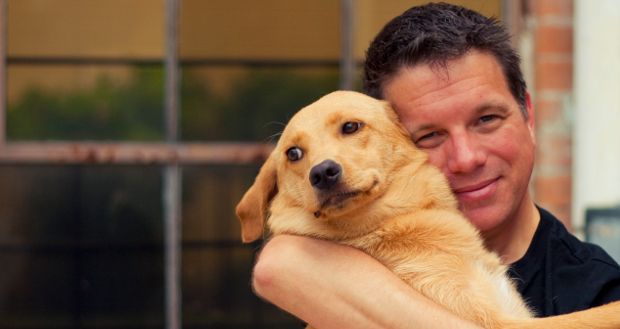Advertisement
Warning: Researcher Says Don’t Hug Your Dog!
| By Lauren Boudreau
Advertisement - Continue reading below

In a new study from Psychology Today, research shows that dogs don’t take kindly to our hugs.
Professor of psychology Stanly Coren, Ph.D., F.R.S.C., from the University of British Columbia, decided to conduct the study after a student didn’t believe that hugging dogs isn’t good for them.
Dr. Coren had brought his dogs to a campus event called “Doggy De-Stress Day” where students got a break from their studies to hangout with dogs in order to de-stress.
During the event, a woman came up to one of Dr. Coren’s dogs and gave it a hug, to which he told her she shouldn’t do that because they don’t like it and it raises their stress levels.
She responded, of course, that hugs and physical contact are essential for human children.
Key word there: human.
Dr. Coren explained that dogs are “cursorial animals,” which means that they are “designed for running.” So, when you hug them, you essentially inhibit their ability to run, which stresses them out. A stressed dog is not a happy dog, and can increase the chances of being bit, especially from a dog you don’t know.
To prove this, all Dr. Coren had to do was look at photos of people hugging dogs, which are everywhere on the internet.
“I used a variety of criteria to try to keep the data as clean and precise as possible,” he wrote. “I only used photos where the dog’s face was clearly visible. I also eliminated situations where one might expect the dog’s stress level to rise because of factors other than being hugged (such as when someone lifts a large dog off the ground while hugging them).”
Some signs that a dog is not comfortable with the hug are when the dog’s head is turned away, when the dog is leaning away, if it’s showing half-moon eyes, if its ears are back, if it’s licking its lips, yawning, or if it’s raising one paw.
Dr. Coren used photos to point out what you should be looking for.


He took a random sample of 250 pictures and said that in 81.6 percent of them, the dogs were showing at least one sign of being uncomfortable. Only 7.6 percent showed dogs that were comfortable being hugged.
“The remaining 10.8 percent of the dogs either were showing neutral or ambiguous responses to this form of physical contact,” he wrote.
Dr. Coren recommends that adults teach their children not to hug dogs, and that people in general should save their hugs for their two-legged friends instead. There are other ways you can show your pet you love them, he says, “with a pat, a kind word, and maybe a treat.”
Advertisement - Continue reading below
Share
On Facebook
